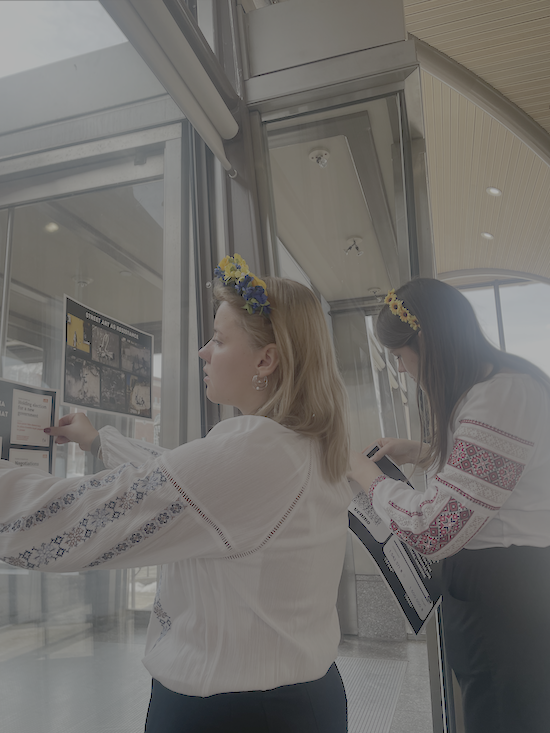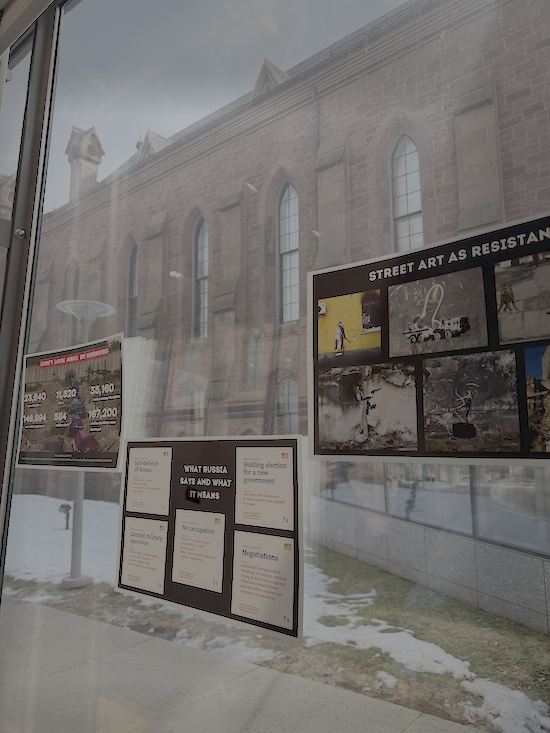For the past two years, Volakova, an international student from Ukraine, has been actively raising awareness about the war in Ukraine at the University. She has organized film screenings, conducted interviews with Ukrainians on the ground this past summer, and hosted on-campus events, including a talk at the Wasch Center for Retired Faculty earlier this month.
April 03, 2025

c/o Lyah Muktavaram
On Monday, Feb. 24 at 12:15 p.m., student organizers and faculty held a vigil at the Zelnick Pavilion to mark the third anniversary of Russia’s invasion and occupation of Ukraine. Organized by Oleksandra Volakova ’27 and Kseniia Guliaeva ’25 and co-sponsored by the Russian, East European, and Eurasian Studies Department (REES), the Dance Department, and the Fries Center for Global Studies, the event drew a crowd of attendees, including faculty and staff members, international students from Russia, Ukraine, and other Eastern European countries, and other students wh0 joined in solidarity with the Ukrainian people.
Lasting for an hour, the vigil began with a series of remarks from faculty speakers and event organizers. After a break for discussion, several students and faculty came up to share personal anecdotes and experiences with the war. The vigil concluded with a minute of silence in mourning for the lives lost in the war, followed by a collective singing of the Ukrainian national anthem.
Around the venue, student organizers hung up posters with information about the war and displayed postcards showing the atrocities of Russia’s invasion. Attendees were encouraged to donate money to Ukrainian communities in need via cash or a printed QR code. Traditional Ukrainian snacks and refreshments were provided, along with badges, temporary tattoos, and stickers that expressed support for Ukraine.
Associate Professor of Dance Katja Kolcio, who was the primary faculty organizer of the vigil, shared her thoughts on the student initiative and the significance of the day.
“This day is a deeply meaningful and emotional day, as it marks the third year of the full-scale Russian invasion of Ukraine,” Kolcio wrote in an email to The Argus. “We are all grateful to everyone who dedicated time, care, and devoted attention to honoring the Ukrainians who are indeed defending principles of freedom, social justice, and democracy for all of us.”
The vigil had a high turnout, with over 30 attendants, although organizers reported having difficulties scheduling the event.
“There was a challenge associated with the fact that a pro-Palestinian rally had been scheduled for the same day,” Assistant Professor of the Practice in REES Natasha Karageorgos wrote in an email to The Argus. “February 24 is a tragic day for Ukraine and all of us who support it, so we asked to reschedule the other rally because they could do it anytime. This request was not satisfied…. But we are grateful that so many people came, even though they had to miss lunch and run from or to a class. We have outstanding students from Ukraine who organized this event.”
Despite stating that she has never met a person who has not been in support of Ukraine at the University, Volakova noted that the momentum for social organization has generally dwindled.
“It was a surprise for everyone in 2022, but now people are not as interested anymore,” Volakova said. “You can see that there [are] more…older people, like more professors who have come, […] instead of students, [for whom] it’s not as interesting anymore.”
Volakova also spoke about some ways that the student body can get involved in aiding Ukraine.
“Please do not forget,” Volakova said. “That’s the most important [thing]. If you cannot make any donations, just read the news. Remember that there are still people who are dying in Ukraine. There are still people who are getting killed, who are being bombed, children who are dying, elderly who cannot leave their villages that are occupied….”
Karageorgos shared ways in which students can academically involve themselves with Ukraine’s cause. She added that she coordinates a project dedicated to the preservation of the legacy of the Mariupol Greeks and that even if students cannot read or write Ukrainian or Russian, they can still assist in editing and proofreading.
Associate Professor of the Practice in French Liana Pshevorska, who is from Ukraine, has set up a GoFundMe for delivering medical aid to Ukrainians. She noted that the faculty will support students with similar initiatives to help Ukraine.
“We as faculty are always happy to support them in any way we can,” Pshevorska wrote in an email to The Argus. “I am confident that this will not be the only event dedicated to Ukraine this year…. There are so many things outside our control, so it’s important to focus on our own actions—donating, contacting representatives, holding public events.”
Faculty members at the vigil emphasized the need for such events, given the changing dynamics of U.S. involvement with Russia. On Monday, Feb. 24, in a resounding break in its foreign policy—which has sent significant military and financial aid to Ukraine since Russia’s invasion in 2022—the United States voted against a U.N. resolution that condemns Russian aggression in Ukraine and calls for the occupied Ukrainian territories to be returned. Alongside U.S. stances on U.N. resolutions that indicated more affinity towards Russia, President Trump has recently called Ukrainian President Volodymyr Zelenskyy a dictator and accused Ukraine of starting the war.

c/o Lyah Muktavaram
“Things are not looking good for Ukraine right now, with President Trump apparently willing to help Putin achieve his goal of establishing Russian control over Ukraine,” Professor of Government Peter Rutland wrote in an email to The Argus.
Kolcio echoed this sentiment, adding that the implications of changing U.S. foreign policy impact American citizens as well.
“I wish more people (and our government in particular) would understand the implications and risks of Putin’s aggression for global peace, democracy, and freedom in general in the world,” Kolcio wrote. “The current gestures being made by our government of appeasing Putin endanger not only Ukraine but the U.S. as well.”
At the vigil, Associate Professor of Russian Language and Literature Emeritus Duffield White recounted his experience witnessing Ukraine’s history unfold from the time he began teaching at the University in the 1970s.
“[In 1991, Ukrainians overwhelmingly] voted to become an independent country,” White said at the vigil. “When Putin started this war three years ago, he intended to take Kyiv within five days, and most people expected that would happen. And it hasn’t. And it has been the biggest miracle that I’ve lived through: these last three years, Ukraine fighting to maintain its independence.”
Faculty also noted the role of the REES department in the ongoing political developments.
“REES has increased its offering of courses on Ukraine in history, government, and arts as the current events unfold,” Kolcio wrote.
According to Yehor Mishchyriak ’26, another international student from Ukraine, although the full-scale war on Ukraine began three years ago, Ukrainians have been facing Russian aggression for much longer.
“This is a horrible event, and it’s been going on for 11 years now,” Mishchyriak said. “Not three years. People often recall three years, [but this] has been only the full-scale war. But the first aggression against the independent Ukraine happened in 2014—this is when my family and I were displaced for the first time.”
Some Ukrainian faculty members remembered even further back.
“A ‘peace’ imposed without Ukrainian participation will not end the genocide,” Kolcio wrote. “History has demonstrated that this would be the case: My uncle died in a Siberian labor camp in the 1970s and my aunt was imprisoned for holding Ukrainian language readings. This was during ‘peace’.”
Nonetheless, faculty and students all emphasized the hope and resilience they carry while organizing and spreading awareness.
“But Ukraine has experienced even more devastating challenges in its past—the famine of the 1930s, the Stalinist purges, the Nazi occupation,” Rutland wrote. “And it bounced back.”
White expressed a similar sentiment at the vigil.
“They’ve been miraculous for 3 years,” White said. “They will prevail.”
Sida Chu, Lyah Muktavaram, and Miles Pinsof-Berlowitz contributed reporting.
Janhavi Munde can be reached at jmunde@wesleyan.edu.